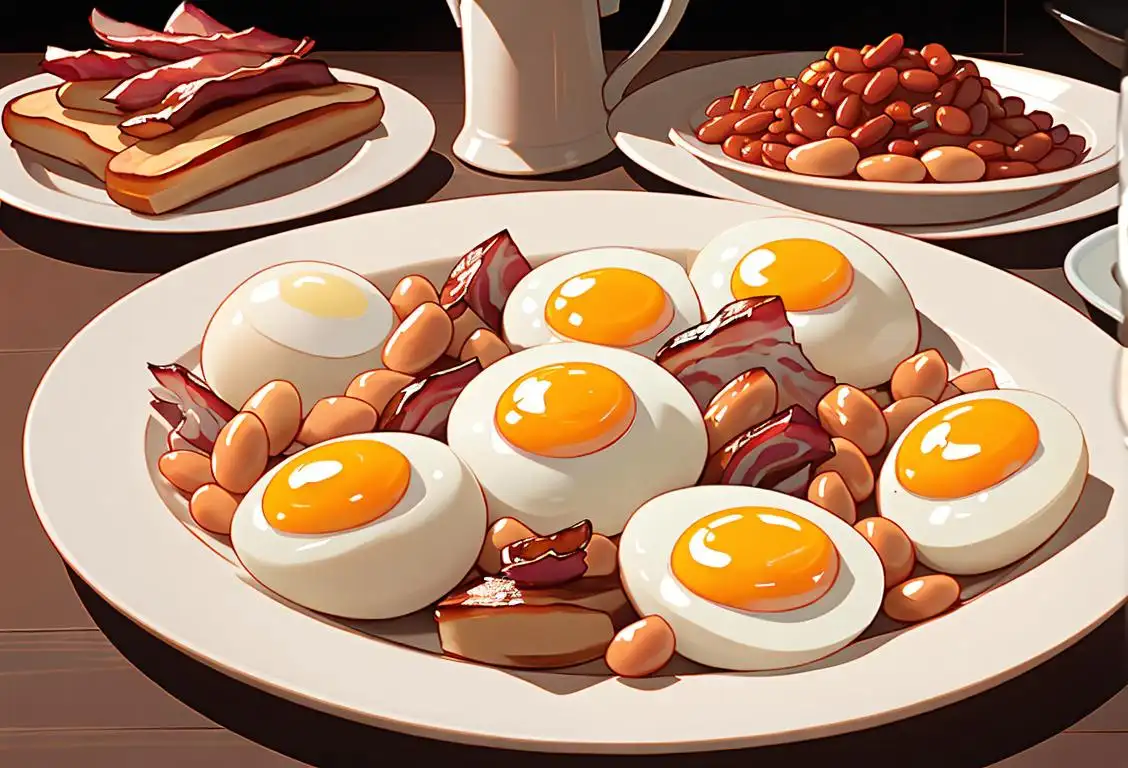National Full English Day

Welcome to the delectable world of National Full English Day! Prepare to dive into a breakfast feast like no other, where bacon sizzles, eggs are cooked to perfection, and beans reign supreme. This glorious celebration pays homage to the quintessential British breakfast - the iconic Full English. So grab your plate, loosen your belt, and join in the delicious revelry!
When is Full English Day?
It's national full english day on the 9th February.
The Origins of National Full English Day
While the exact origins of National Full English Day are as elusive as the perfect runny egg, we can trace its popularity back to the internet. On the 9th of February 2018, the online world erupted with mentions of this glorious breakfast ensemble. People everywhere rejoiced in the opportunity to honor the Full English in all its greasy glory.
This day quickly gained momentum and became a beloved annual celebration for breakfast enthusiasts, bacon lovers, and pancake flippers worldwide. It's a day to celebrate the comforting and hearty flavors of a traditional British breakfast.
The Perfect Full English
What exactly makes a Full English? Well, it's a delightful combination of crispy bacon, hearty sausages, plump grilled tomatoes, perfectly cooked eggs, buttery mushrooms, savory black pudding, and a side of baked beans. And let's not forget the golden toast and a steaming cup of tea. It's a breakfast fit for champions - or anyone who loves indulging in a plateful of deliciousness.
Celebrating National Full English Day
On this day, people come together to enjoy a scrumptious Full English breakfast. Whether you whip it up at home, visit your favorite breakfast spot, or join in a communal gathering, the goal is to relish every bite. Don't forget to spread the word on social media, share mouthwatering pictures, and let your friends know how you're starting the day with a bang!
History behind the term 'Full English'
1300s
The Breakfast Beginnings
In the 14th century, a morning meal known as the 'breakfast' started to gain popularity in England. This meal was typically made up of bread, meat, and ale, and was consumed to provide energy for the day. However, it wasn't quite what we think of today as a 'Full English.'
1430
The First Appearance
The term 'full english' first appeared in the early 15th century, around the year 1430. It referred to a hearty breakfast that encompassed a range of traditional English foods.
1600s
Adding More Variety
By the 17th century, the breakfast meal had evolved to include additional items such as eggs, fish, and even leftovers from the previous day's dinner. This expansion of ingredients added more variety and flavors to the morning meal, setting the stage for the development of the 'Full English'.
1860
The Victorian Era
During the Victorian era, which spanned from the mid-19th to the early 20th century, the 'full english' breakfast gained popularity among the middle and upper classes. It became a symbol of wealth and status, with elaborate spreads including items such as bacon, eggs, sausages, grilled tomatoes, mushrooms, black pudding, and toast.
1925
The Fry-Up
In the 1920s, the 'full english' breakfast became commonly known as a 'fry-up.' This term emphasized the cooking method of frying various ingredients. A fry-up typically included fried eggs, bacon, sausages, grilled tomatoes, mushrooms, and toast, all cooked in the same pan.
1800s
The Rise of Cooked Breakfast
It was during the 19th century that the concept of the 'Full English' breakfast started to take shape. With the Industrial Revolution and an increase in wealth, people had more time and resources to enjoy a substantial breakfast. Cooked breakfasts became popular among the upper classes, featuring items like bacon, sausages, eggs, and grilled tomatoes.
1900s
The Full English Becomes Iconic
In the 20th century, the 'Full English' breakfast became an iconic part of British cuisine. The elements of a Full English were standardized, typically including bacon, eggs, sausages, black pudding, baked beans, grilled tomatoes, mushrooms, and toast. It was considered a hearty and indulgent start to the day and remains a beloved cultural tradition in England.
1945
Post-War Rationing
After World War II, rationing was implemented in the United Kingdom. The 'full english' breakfast became less common due to limited food supplies and the need to prioritize essential items. However, some variations of the breakfast, using available ingredients, still managed to satisfy the appetite of the nation.
1950
Tourism and Iconic Representation
In the 1950s, with the rise of tourism, the 'full english' breakfast regained its popularity and became a quintessential part of British cuisine. Hotels and restaurants started offering it as a signature dish, attracting both domestic and international visitors.
2000
Modern Variations
In the 21st century, the 'full english' breakfast has evolved to accommodate changing dietary preferences. Vegetarian and vegan versions have gained popularity, replacing meat items with plant-based sausages or alternative protein sources. Additionally, regional variations have emerged, such as the inclusion of haggis in Scotland or white pudding in Ireland.
Did you know?
Did you know that Full English breakfasts are thought to have originated in the 13th century? They were initially enjoyed by the British gentry as a hearty way to start the day. So when you tuck into your Full English, you're participating in a time-honored breakfast tradition!Tagged
romance food funFirst identified
9th February 2018Most mentioned on
9th February 2018Total mentions
466Other days
One Day
Family Day
Action Day
Kissing Fried Chicken Day
Vodka Boyfriend Day
Awareness Day
Opposite Day
Suicide Prevention Month Day
Happiness Day
Nutty Fudge Day









